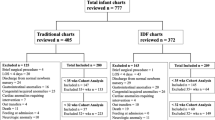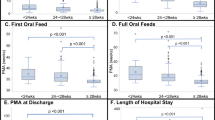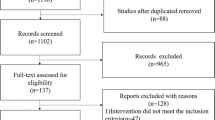Abstract
Objective:
The purpose of this analysis was to investigate the effect of oral feeding experience on clinical outcomes (time to full oral feedings and length of stay) in preterm infants.
Study Design:
This analysis was completed on 92 infants who participated in a longitudinal, non-experimental study. Data were collected daily for maturity, weight and experience at oral feeding. Additional data were collected to assess overall morbidity.
Result:
Time to full oral feedings was predicted by experience at oral feeding and morbidity. Length of stay from the start of oral feedings until discharge was predicted by feeding experience and by maturity at the first oral feeding. Weight gain was not affected by feeding experience.
Conclusion:
Experience at feeding may result in more rapid transition to full oral feedings regardless of severity of illness and may contribute to shorter length of stay. These positive clinical outcomes related to feeding experience warrant further research attention.
This is a preview of subscription content, access via your institution
Access options
Subscribe to this journal
Receive 12 print issues and online access
$259.00 per year
only $21.58 per issue
Buy this article
- Purchase on Springer Link
- Instant access to full article PDF
Prices may be subject to local taxes which are calculated during checkout

Similar content being viewed by others
References
American Academy of Pediatrics. Hospital discharge of the high-risk neonate. Pediatrics 1998; 102 (2): 411–417.
Kirkby SR, Greenspan JS, Kornhauser M, Schneiderman R . Clinical outcomes and cost of the moderately preterm infant. Adv Neonat Care 2007; 7 (2): 80–87.
Amaizu N, Shulman R, Schanler R, Lau C . Maturation of oral feeding skills in preterm infants. Acta Paediatr 2008; 97 (1): 61–67.
Ross ES, Browne JV . Developmental progression of feeding skills: an approach to supporting feeding in preterm infants. Sem Neonatol 2002; 7 (6): 469–475.
Dodrill P, McMahon S, Ward E, Weir K, Donovan T, Riddle B . Long-term oral sensitivity and feeding skills of low-risk pre-term infants. Early Hum Dev 2004; 76: 23–27.
Thoyre SM, Carlson JR . Preterm infants’ behavioral indicators of oxygen decline during bottle feeding. J Adv Nurs 2003; 43 (631): 641.
Thoyre SM, Brown RL . Factors contributing to preterm infant engagement during bottle-feeding. Nurs Res 2004; 53 (5): 304–313.
Pickler RH, Best AM, Reyna BA, Wetzel PA, Gutcher GR . Prediction of feeding performance in preterm infants. Newborn Infant Nurs Rev 2005; 5 (3): 116–123.
Pickler RH, Mauck AG, Geldmaker B . Bottle-feeding histories of preterm infants. J Obstet Gynecol Neonatal Nurs 1997; 26 (4): 414–420.
McCain GC, Gartside P, Greenberg JM, Lott JW . A feeding protocol for healthy preterm infants that shortens time to oral feeding. J Pediatr 2001; 139 (3): 374–379.
Fucile S, Gisel E, Lau C . Oral stimulation accelerates the transition from tube to oral feeding in preterm infants. J Pediatr 2002; 141 (230): 236.
Pridham K, Bhattacharya A, Thoyre S, Steward D, Bamberger J, Wells J et al. Exploration of the contribution of biobehavioral variables to the energy expenditure of preterm infants. Biol Res Nurs 2005; 6 (3): 216–229.
Korner AF, Stevenson DK, Kraemer HC, Spiker D, Scott DT, Constantinou J et al. Prediction of the development of low birth weight preterm infants by a new neonatal medical index. J Dev Behav Pediatr 1993; 14 (2): 106–111.
Korner AF, Kraemer HC, Reade EP, Forrest T, Dimiceli S, Thom VA . A methodological approach to developing an assessment procedure for testing the neurobehavioral maturity of preterm infants. Child Dev 1987; 58 (6): 1478–1487.
Pickler RH, Best AM, Reyna BA, Gutcher G, Wetzel PA . Predictors of nutritive sucking in preterm infants. J Perinatol 2006; 26 (11): 693–699.
Simpson C, Schanler RJ, Lau C . Early introduction of oral feeding in preterm infants. Pediatrics 2002; 110 (3): 517–522.
Hack M, Fanaroff AA . Outcomes of children of extremely low birthweight and gestational age in the 1990's. Early Hum Dev 1999; 53 (193): 218.
Cuevas KD, Silver DR, Brooten D, Youngblut JM, Bobo CM . The cost of prematurity: hospital charges at birth and frequency of rehospitalizations and acute care visits over the first year of life: a comparison by gestational age and birth weight. Am J Nurs 2005; 105 (7): 56–64.
Catelin C, Tordjman S, Morin V, Oger E, Sizun J . Clinical, physiologic, and biologic impact of environmental and behavioral interventions in neonates during a routine nursing procedure. J Pain 2005; 6 (12): 791–797.
Gressens P, Rogido M, Paindaveine B, Sola A . The impact of neonatal intensive care practices on the developing brain. Pediatrics 2002; 140: 646–653.
Howe TH, Lin KC, Su CT, Hsieh CL . A review of psychometric properties of feeding assessment tools used in neonates. J Obstet Gynecol Neonatal Nurs 2008; 37 (3): 338–349.
Als H, Duffy FH, McAnulty GB, Rivkin MJ, Vajapeyam S, Mulkern RV et al. Early experience alters brain function and structure. Pediatrics 2004; 113 (4): 846–857.
Pickler RH, Chiaranai C, Reyna BA . Relationship of the first suck burst to feeding outcomes in preterm infants. J Perinat Neonatal Nurs 2006; 20 (2): 157–162.
Thoyre SM . Feeding outcomes of extremely premature infants after neonatal care. J Obstet Gynecol Neonatal Nurs 2007; 36 (4): 366–376.
Acknowledgements
This study is supported by R01 NR005182 and F31 NR007929 from the National Institute of Nursing Research, National Institutes of Health.
Author information
Authors and Affiliations
Corresponding author
Rights and permissions
About this article
Cite this article
Pickler, R., Best, A. & Crosson, D. The effect of feeding experience on clinical outcomes in preterm infants. J Perinatol 29, 124–129 (2009). https://doi.org/10.1038/jp.2008.140
Received:
Revised:
Accepted:
Published:
Issue Date:
DOI: https://doi.org/10.1038/jp.2008.140
Keywords
This article is cited by
-
Profiling non-nutritive sucking skills in full-term and preterm neonates
The Egyptian Journal of Otolaryngology (2023)
-
Early skin contact combined with mother’s breastfeeding to shorten the process of premature infants ≤ 30 weeks of gestation to achieve full oral feeding: the study protocol of a randomized controlled trial
Trials (2021)
-
Oral Alimentation in Neonatal and Adult Populations Requiring High-Flow Oxygen via Nasal Cannula
Dysphagia (2016)
-
Patterned feeding experience for preterm infants: study protocol for a randomized controlled trial
Trials (2015)
-
Effects of prefeeding oral stimulation on feeding performance of preterm infants
The Indian Journal of Pediatrics (2010)



